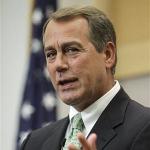24 August 2010

Photo: AP
House Minority Leader John Boehner (R-Ohio) speaks about jobs and the economy at the City Club of Cleveland, 24 Aug 2010
In substance, the remarks Republican Representative John Boehner delivered in Cleveland, Ohio were not much different from those he has made in recent months.
For months Boehner, the House of Representatives minority leader, and others in his party, have complained about Obama administration deficit spending, and the president's plan to allow tax cuts for wealthier Americans approved under former Republican President George W. Bush to expire.
There was more of that from Mr. Boehner on Tuesday. The difference is that he is now actively campaigning to be speaker of the House of Representatives, should Republicans take control of the House from Democrats in the November mid-term congressional elections.
Boehner called for the resignation of key members of the president's economic team, and said the November elections will be a referendum on Mr. Obama's policies.
"President Obama should ask for, and accept, the resignations of the remaining members of his economic team, starting with Secretary Geithner and Larry Summers, the head of the National Economic Council," he said. "Now, this is no substitute for a referendum on the president's job-killing agenda. That question will be put before the American people in due time. But we do not have the luxury of waiting months for the president to pick scapegoats for his failing 'stimulus' policies."
Boehner's remarks also included a blunt personal attack on the president. Americans, he said, could not afford "another 19 months of government-as-community organizer," a reference to one of Mr. Obama's pre-White House political career roles.
Hitting back, Obama communications director Dan Pfeiffer accused the House minority leader of advocating "the same old failed economic policies that steered our economy into the ditch."
In Martha's Vineyard, where the president is vacationing, White House Deputy Press Secretary Bill Burton had this response.
"Boehner would fire the very people who helped to make the tough decisions, who helped to do the hard work, to get our economy moving in the right direction again," he said.
Aside from familiar attacks on the president's economic policies, Boehner's speech included a dose of the kind of anti-Washington rhetoric that has substantial appeal with voters.
Referring to what he called a "tired, bloated, and broken Washington," Boehner outlined what he would do if Republicans win control of the House and he were to become speaker.
"I would run the House differently. And I don't just mean differently than the way Democrats are running it today," he said. "I mean differently than both Democrats or Republicans in the past. That means challenging the old ways in Washington, getting to the bottom of what drives people crazy, and then trying to fix it once and for all."
Boehner provided no specifics of how he would go about changing the political atmosphere in Washington, something that Mr. Obama said he wanted to work toward at the start of his presidency.
In other administration response, Vice President Joe Biden asserted that in the November congressional elections, Americans will reject Republican policies that he said had driven the economy and middle class into the ground.
"Let me tell you, there are millions upon millions of Americans who saw their savings, their paychecks, shrink, lost their jobs, their homes," he said. "Mr. Boehner is nostalgic for those good old days. But the American people are not. They don't want to go back. They want to move forward."
Biden's remarks are in essence, the game plan that President Obama, others in his administration, and congressional Democrats will pursue in the weeks before the November election.
With the president's job approval ratings dropping as low as 41 percent in one recent poll, Democrats will more intensively portray Republicans as advocating reckless policies that might reverse economic gains achieved so far under Mr. Obama, however fragile those may be.